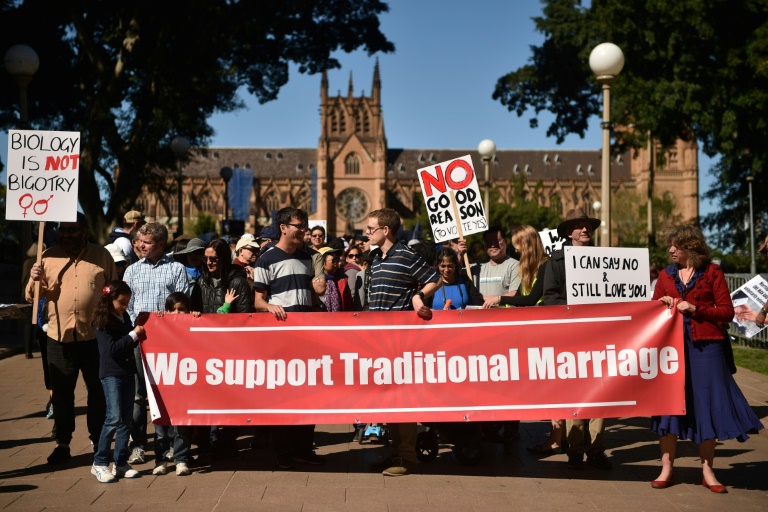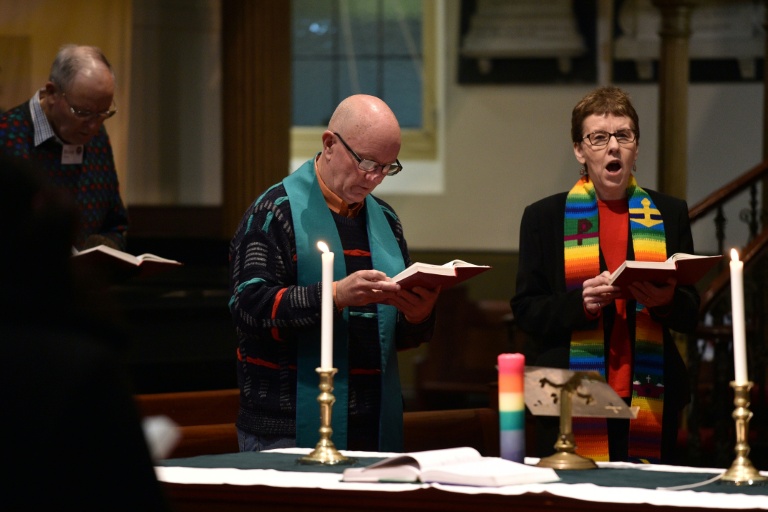As Australia prepares for a contentious postal vote on legalising gay marriage, fierce divisions have emerged within the church, with many Christians disregarding traditional religious views as outdated.
Although attitudes to same-sex marriage vary across denominations and congregations — and even between the pulpit and the pews — many Australians view the church as the greatest source of resistance to such unions.
“I think it is really bad news for the church that it is seen as taking this exclusive, judgemental, unloving stance toward a significant part of the Australian community,” Reverend Margaret Mayman, minister of the Pitt Street Uniting Church in Sydney, told AFP.
“There is obviously a huge gap between the leadership of some denominations and the people in the pews,” she said.
A recent survey commissioned by equality advocates found two thirds of Catholics support gay marriage, as do 59 percent of Anglican, Uniting Church and Church of England followers.

Although attitudes to same-sex marriage vary across denominations and congregations, from the pulpit and among the pews, many Australians view the church as the greatest source of resistance to such unions
Ballots have been dispatched to some 15 million Australians, with the voluntary poll due kick off Tuesday and close on November 7, with the result out later that month.
If most Australians say “yes”, the government will hold a parliamentary vote on the issue, but no action will be taken in the event of a “no” outcome.
– ‘Fear-mongering’ –
Some of the country’s most senior Catholics have openly encouraged followers to vote against gay marriage.
“The Catholic Church… teaches that marriage is a natural institution established by God to be a permanent union between one man and one woman, intended towards the formation of a family in which children are born and nurtured,” Melbourne Archbishop Denis Hart said in an open letter last month.
Sydney Archbishop Anthony Fisher warned that a move to legalise same-sex marriage would threaten the religious freedoms of teachers and doctors in Catholic institutions who would be forced to fall in line with views they did not hold.

Reverend Margaret Mayman (R), minister of the Pitt Street Uniting Church, heads a Sunday service in Sydney
Other prominent figures have acknowledged a divide between the church and the public.
“There is almost total unanimity amongst the young in favour of same-sex marriage, and arguments against it have almost no impact on them,” Father Chris Middleton, rector of one of Australia’s most prestigious Catholic schools, Xavier College, wrote recently to teachers, parents and students.
Outspoken Anglican minister Reverend Keith Mascord said arguments that gay marriage violated long-held doctrine or threatened religious freedoms were irrelevant.
“The church has got a terrible, shameful legacy, which it’s adding to by fear-mongering and campaigning,” he said.
On the opposing side, the Coalition of Marriage, backed by the Australian Christian Lobby, has become the face of the “no” drive.
Controversial advertisements from the group featuring mothers complaining about schools encouraging boys to wear dresses or about children being asked to role play same-sex unions have been branded offensive and scaremongering by gay rights advocates.
“Beyond the wedding ceremony there is a whole bunch of consequences that flow for freedom of speech, for gender ideology in schools and most importantly for the rights of a child to be known and loved by the mother and father”, Australian Christian Lobby director Lyle Shelton told AFP.
Just over half of Australia’s 25 million people identify as Christian and Shelton claims the majority are united in their opposition to gay marriage.
“In any organisation, particularly an entity as big as the church and its diversity, there will be minorities that no longer hold to orthodox Christian teaching on marriage, but the overwhelming majority are in favour of preserving marriage.”
– ‘Grassroots acceptance’ –
But not all churchgoers agree.
Ardent Catholic Les Mico has two gay adult sons and told AFP his faith prompted him to become an advocate for marriage equality.
He works with young gay Catholics who struggle to reconcile their sexuality with the church’s teaching — which he said caused them mental anguish and triggered suicide attempts.
“What we find is that it is the church’s attitudes to gay people across the board that has actually pushed them into that area because they feel so insignificant, inferior, have no dignity for themselves and are not welcome within the arms of the church,” Mico said.
A change in the civil definition of marriage would be one step toward resolving that conflict with the church still free to marry who they choose, Mico said, but added that religious institutions needed to encourage open discussion of the issue.
“Certainly there is tension in the church,” he said, adding that senior church figures had held onto traditional views and were sometimes at odds with opinion in local congregations.
“We do find at grassroots level there is a greater affinity with what is going on and a greater acceptance.”






